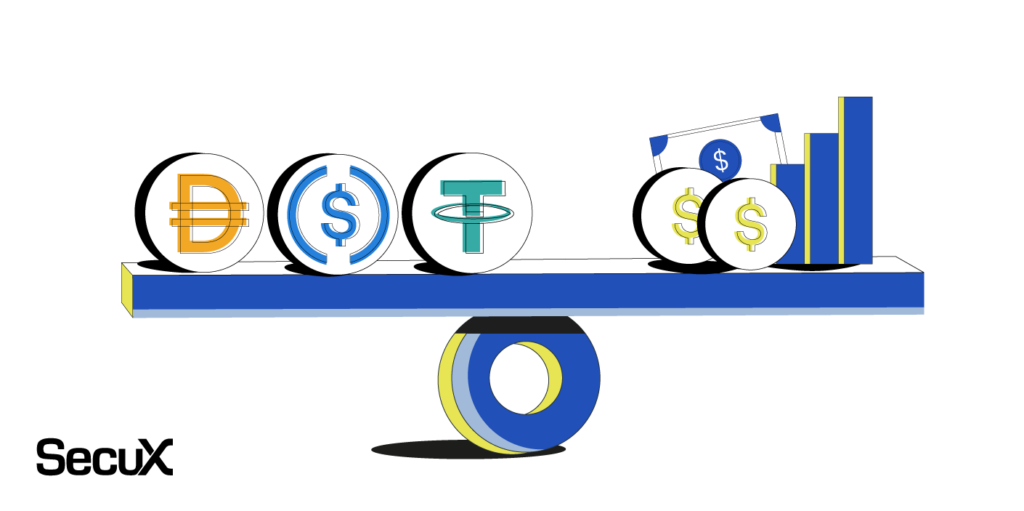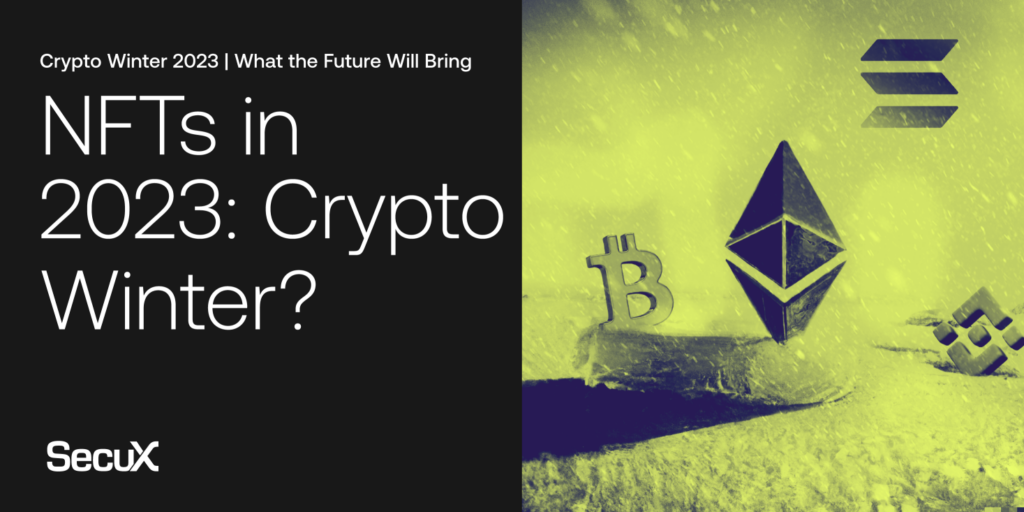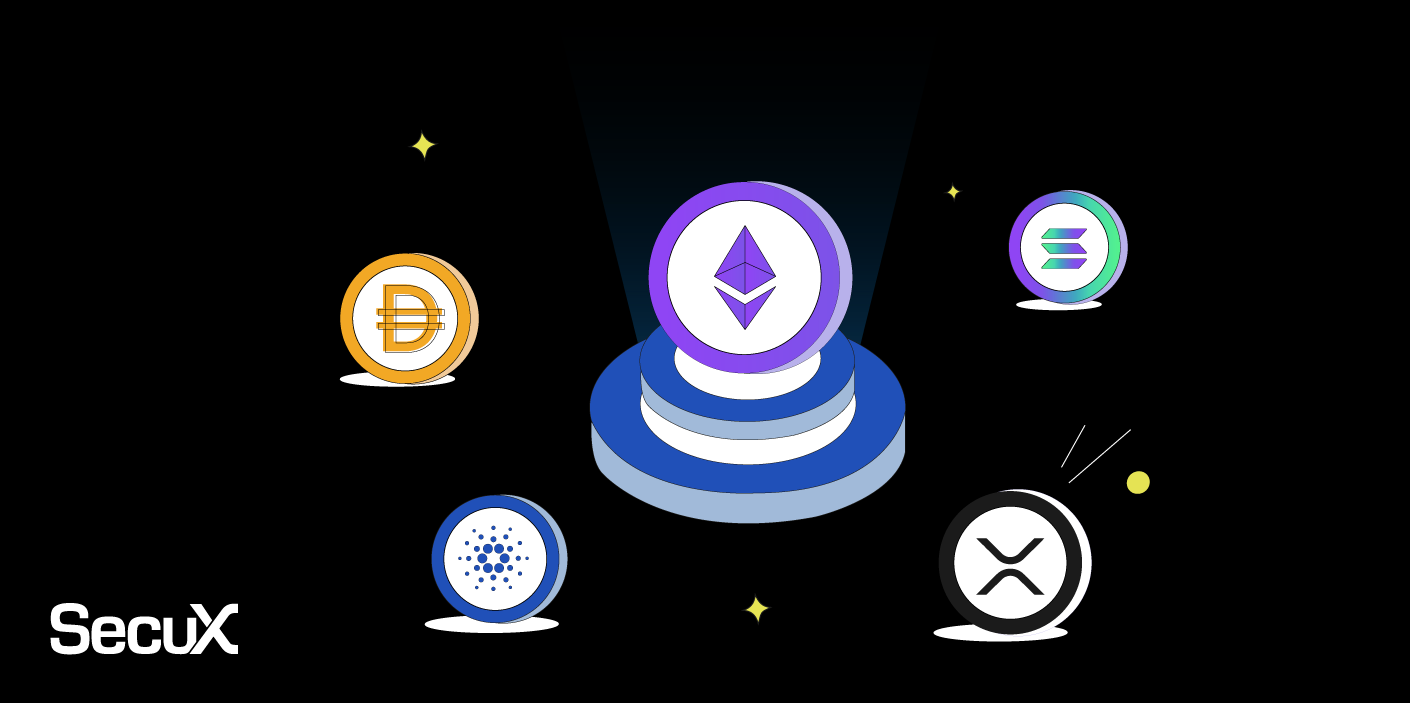
Disclaimer: The information provided in this article is for educational purposes only and should not be considered as financial advice.
Bitcoin hit the market in 2009 and really took the world by storm as its value soared beyond belief. Digital finance became a hotly discussed topic and people eagerly awaited to see if history would repeat itself.
Bitcoin led the way and spawned plenty of other assets that provide alternative investment options to Bitcoin. What exactly are altcoins? The answer is in the name.
Table of Contents
- What are Altcoins? The Alternative to Bitcoin
Altcoins Explained
Altcoin is a portmanteau for alternative coins. An alternative coin to what? Bitcoin. Not only do altcoins exist as another investment opportunity, but they also provide different features, purposes, and improvements to its predecessor.
Altcoins are all different. Some aim to speed up transaction times, while others look to promote more privacy. Each altcoin will typically operate on its own blockchain. These blockchains utilize their own consensus mechanisms to validate transactions and secure the network.
There are plenty of altcoins on the market. Many new ones are introduced regularly while previous ones may see a decrease in popularity and others may cease to function.
Popular altcoins we see today are:
- Ethereum (ETH)
- Ripple (XRP)
- Binance Coin (BNB)
- Cardano (ADA)
- Litecoin (LTC)
Different Types of Altcoins
We mentioned altcoins being different as they provide various functions, purposes, and features. Let’s take a closer look at the types below.
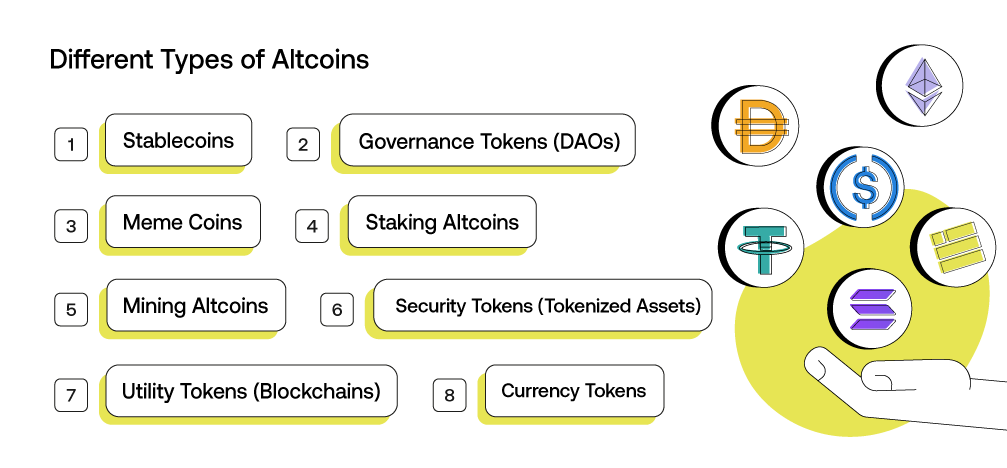
- Stablecoins
Stablecoins are created to offset volatile cryptocurrencies. The crypto market can be unstable, so many altcoins in the form of stablecoins were designed to balance it by pegging their value to a stable fiat currency (USD) or commodity (gold). Some stablecoins are Dai (DAI) and USD coin (USDC). - Governance Tokens (DAOs)
Governance altcoins provide voting and decision-making power to those who hold it in a decentralized autonomous organization (DAO). The more of these coins you hold, the more control you have over the organization’s outcome. - Meme Coins
Meme coins are by no means a form of stable investing, but they can award enormous wealth to holders who are lucky. These can be seen as joke coins that do not possess utility or features like many of the other altcoins.
Instead, meme coins rely heavily on the hype generated for their value. An example of a famous meme coin is Dogecoin, which has since gained some real-world utility. - Staking Altcoins
Staking altcoins belong on proof-of-stake (PoS) blockchains. They utilize the staking mechanism to reach consensus and provide security on the chain. If you have this type of altcoin, you can choose to stake them for transaction processing. If you are selected by the blockchain network to verify a block, then you will receive rewards. - Mining Altcoins
Alternatively, we have mining altcoins (mining-based coins) which work on proof-of-work (PoW) blockchain technology, opposite from staking altcoins. - Security Tokens (Tokenized Assets)
Security tokens are real-world assets that have been tokenized (digitized) and then made available to investors. Equity in a company, real estate, and commodities are all examples of assets that can become security tokens. - Utility Tokens (Blockchains)
This type of altcoin is designed to provide utility within a blockchain. They can provide access to a service or product and can be seen as digital currencies within decentralized networks. - Currency Tokens
Currency tokens are payment tokens, which also go by the much more familiar name – cryptocurrencies. They function like a digital form of money to be used the same way within decentralized applications.
How to Liquidate Your Altcoins
You are able to liquidate your altcoins using both a centralized and decentralized exchange (CEX and DEX).
For a centralized exchange, the steps are:
- Choose a platform and make sure it offers trading for your altcoin of choice and the fiat or other cryptocurrency.
- Create an account on the CEX
- Deposit your altcoins to the CEX by following its instructions
- Specify the amount of altcoins to sell and set the price
- Confirm the trade by reviewing the details and executing
- Withdraw the funds
To liquidate via a decentralized exchange:
- Choose a DEX
- Connect your crypto wallet to the DEX
- Swap altcoins for crypto by specifying the desired amount
- Confirm the transaction and go through with the approval process on your wallet if necessary
- Receive the funds in your wallet
Altcoins VS. Coins VS. Tokens
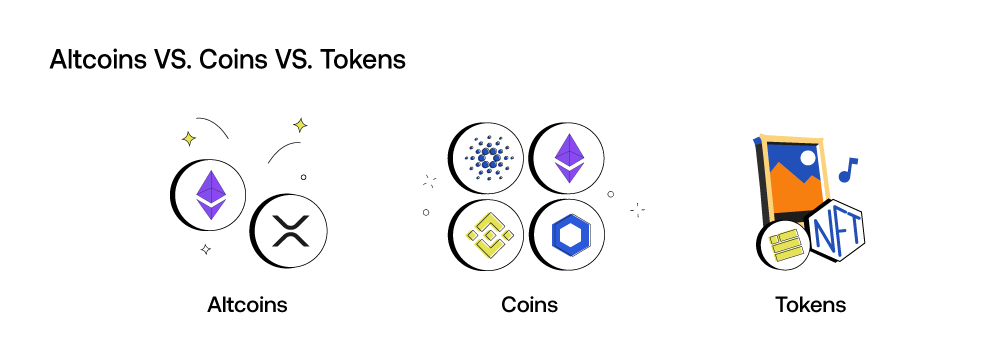
Altcoins
Short for alternative coins, these are cryptocurrencies created after Bitcoin such as ETH and XRP.
Coins
Coins usually refer to cryptocurrencies that have their own blockchain used mainly for transactions on the chain, like utility tokens.
Tokens
Tokens can be many things such as ownership of digital assets like NFTs. They are typically assets built on blockchains.
Pros and Cons of Altcoins
Why not just stick with coins on the Bitcoin blockchain? What are the benefits of having this many altcoins?
Pros
- Growth potential – Because of the new features they introduce, altcoins have higher growth and scaling potential.
- Lower prices – Bitcoin is worth an arm and a leg these days, and many altcoins have a lower entry barrier in terms of price.
- Advancements and innovation – A lot of altcoins experiment with new technology which helps to advance blockchain innovation.
- Portfolio diversity – Investing in crypto other than Bitcoin can help diversify investment profiles and reduce risk.
Cons
- Volatility – Depending on the type of altcoin (meme coins) can be more volatile than established ones such as ETH on the Ethereum blockchain.
- Possible failure – Not all altcoins gain traction and have staying power. They may fail to gain widespread adoption.
- Regulation – While the regulations surrounding crypto investing are still murky, new and emerging altcoins may hit regulatory snags that impact their value and usability.
Conclusion
In our eyes, altcoins bring more benefits than drawbacks. They offer investors a wider range of investment options other than Bitcoin. They also bring more growth and innovation to the digital asset industry. While trust, risk and regulation are still concerns, smart contracts can help add some confidence to transactions with altcoins.
Related Articles:
- Stablecoins – What are They and What Do They Do?
- How to Store Shiba Inu Tokens in a SecuX Hardware Wallet
- How an EVM-Compatible Cold Wallet Can Make Your Life Easier
Sources:
- https://bitflyer.com/en-eu/faq/55-7#:~:text=What%20is%20the%20meaning%20of,the%20cryptocurrencies%20other%20than%20Bitcoin
- https://www.investopedia.com/terms/a/altcoin.asp
- https://www.fool.com/investing/stock-market/market-sectors/financials/cryptocurrency-stocks/altcoin/
- https://www.britannica.com/money/what-are-altcoins-tokens
